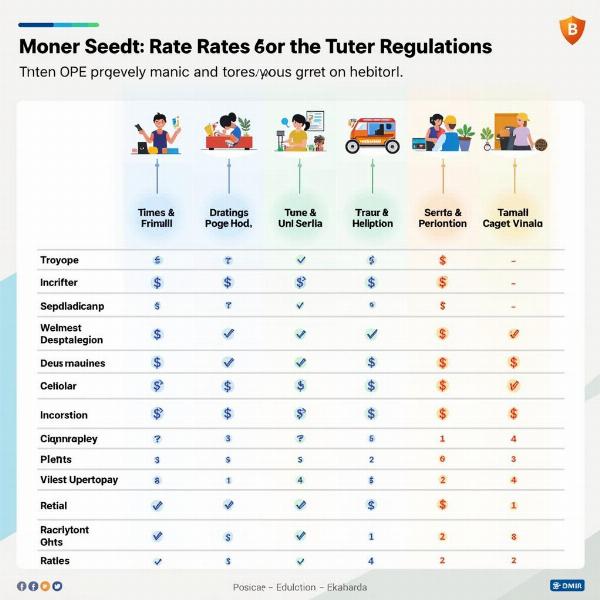Understanding the meaning of “majduri” in Hindi is crucial for anyone navigating the social and economic landscape of India. “Majduri” (मजदूरी) translates to “wages” or “labor charges” in English. It represents the payment a worker receives in exchange for their physical or mental effort. This seemingly simple term has deep implications for millions of Indians who rely on daily wages for their livelihood. Beyond its literal definition, “majduri” carries connotations of hard work, struggle, and the socioeconomic realities of the working class.
Exploring the Nuances of “Majduri”
“Majduri” is more than just a word; it’s a concept intertwined with the lives of countless Indians. It’s the compensation for back-breaking labor in fields, factories, and construction sites. It’s the money that puts food on the table and roofs over heads. Understanding “majduri” is about understanding the very fabric of Indian society.
Different Forms of Majduri
The term “majduri” encompasses various forms of labor compensation:
- Daily Majduri (दिहाड़ी मजदूरी): This refers to wages paid on a daily basis, common among unskilled or semi-skilled laborers.
- Weekly Majduri (साप्ताहिक मजदूरी): Wages paid weekly, often for more regular or skilled work.
- Monthly Majduri (मासिक मजदूरी): A more formal arrangement where wages are paid monthly, typically for salaried employees.
- Piece-rate Majduri (टुकड़ों के हिसाब से मजदूरी): Payment based on the number of units produced or tasks completed.
The Socioeconomic Impact of Majduri
The concept of “majduri” is deeply connected to India’s socioeconomic realities. It represents the struggles and aspirations of a vast segment of the population. Fluctuations in “majduri” rates can have significant consequences for families and communities.
Majduri and the Law
India has various labor laws aimed at protecting the rights of “majduri” earners, including minimum wage regulations and provisions for social security. These laws seek to ensure fair compensation and decent working conditions for those who depend on “majduri” for their survival.
Minimum Wage Laws in India
The Minimum Wages Act of 1948 aims to protect workers from exploitation by establishing minimum wage rates for different industries and regions. However, enforcement remains a challenge, and many workers still earn less than the prescribed minimum wage.
 Minimum Wage Chart in India
Minimum Wage Chart in India
The Role of Trade Unions
Trade unions play a crucial role in advocating for the rights of “majduri” earners and negotiating for better wages and working conditions. They provide a collective voice for workers and strive to improve their livelihoods.
Majduri in the Informal Sector
A significant portion of India’s workforce is employed in the informal sector, where “majduri” is often negotiated on a daily or weekly basis. This sector lacks the formal structure and regulations of the organized sector, making workers vulnerable to exploitation and unstable income.
Challenges Faced by Majduri Earners
“Majduri” earners, particularly in the informal sector, face various challenges:
- Low wages: Many workers earn barely enough to meet their basic needs.
- Lack of job security: Daily wage earners often face unpredictable work availability.
- Poor working conditions: Many workers are exposed to hazardous working environments.
- Limited access to social security: Informal sector workers often lack access to benefits such as health insurance and pensions.
Conclusion: Understanding the Significance of “Majduri”
“Majduri” is more than just an economic term; it’s a reflection of the lives and struggles of millions of Indians. Understanding its nuances is essential for comprehending the social and economic realities of the country. By supporting fair wages and advocating for better working conditions, we can contribute to a more just and equitable society for all “majduri” earners.
FAQ
- What is the literal meaning of “majduri” in Hindi? Majduri means wages or labor charges.
- What are the different types of “majduri”? Types include daily, weekly, monthly, and piece-rate “majduri.”
- What law governs minimum wages in India? The Minimum Wages Act of 1948.
- Who are the most vulnerable “majduri” earners? Those in the informal sector.
- What role do trade unions play concerning “majduri”? They advocate for better wages and working conditions.
- Why is understanding “majduri” important? It helps us understand the socioeconomic realities of India.
- How can we support “majduri” earners? By advocating for fair wages and decent working conditions.
Meaning-Hindi.in is your trusted partner for professional Hindi translation services. We offer a wide range of services, from business document translation to legal and technical translation. Our team of expert linguists ensures accuracy and cultural sensitivity in every project. Whether you need website localization or educational material translated, Meaning-Hindi.in delivers quality and timely service. Contact us today at [email protected] or call us at +91 11-4502-7584. Let Meaning-Hindi.in help you bridge the language gap and connect with your target audience effectively.